As the 1960s marched on, Walt Disney finally began to tire out, beset by work with animated and live action films, television, and theme parks—both the known, open park in California, by now open for ten years, and the still top secret park in central Florida, slowly grabbing up land and legal rights. But the mixed critical response to the Sword in the Stone—a film he had little involvement in—worried him, and he decided to take a more active role in the next animated film. This included agreeing with the suggestion of story artist Bill Peet that Disney’s next film should focus on one of the studio’s clear strengths—funny animals—and also once again taking an direct role in story development as the artists started working on The Jungle Book.
This active role unfortunately led to the departure of Bill Peet from Disney, since the two had different visions for the film. Peet wanted to stay more or less faithful to the text; Walt Disney, wanting something more amusing, urged the animators to ignore Rudyard Kipling whenever possible. This was not totally without precedent or foundation: Disney had, after all, greatly condensed and changed the source material for Pinocchio, introduced a dragon to Sleeping Beauty, and eliminated most of the original Wind of the Willows, to name only some of the bigger changes.
But The Jungle Book was to depart even further from the source material, with only the first ten minutes of the film having that much to do with the original Mowgli stories. About the only remaining elements: Mowgli is raised by wolves; Shere Khan the Tiger wants to eat him; and half the characters have the same names. Otherwise, plot elements, characters, motivations and even the end of the Mowgli stories are completely changed. Not just because Walt Disney urged animators to ignore Kipling, but because for The Jungle Book, animators were trying something new: basing their cartoon characters not on the source material, but the voice actors.
Take, for instance, Baloo, in the original text a wise, respected elderly mentor who patiently drills Mowgli in the laws of the jungle and who looks like a bear; in the film, a wisecracking, easily distracted slacker with a tendency to break into song who advises Mowgli to chill out and just focus on the bare necessities, and who rather looks like singer/comedian Phil Harris.
Animators loved the result, so much that they not only increased the role of Baloo in the film, but also started wondering if they could bring in a few other well-known singers. Like, say, the Beatles. Or maybe Louis Prima. The Beatles declined, although four vultures in the final film do sport suspiciously Beatles like haircuts and speak with British accents. But Louis Prima, then at the peak of musical career number four or five, depending upon how you count them, and needing a distraction from major life events at the time, did agree to jump on.
And that, everyone, is why a film about a boy and a bunch of animals in India stops for a big American swing dance number dead smack in the middle of the film, led by King Louie the orangutan cheerfully crooning, “I’m the king of the swingers, whoa!”
I love it.
Having gone so far, animators did not hesitate to make several other drastic changes: Kaa the snake and the elephants were turned into comedy figures; the wolves were almost entirely eliminated; and —presumably in hopes of replicating the ongoing success of Dumbo—an adorable little baby elephant was added.
So it’s not exactly from the book.
(It’s not at all from the book.)
On the other hand, it has Phil Harris and Louis Prima, as a dancing bear and a swinging orangutan.
Let us not be too critical.
It was also a major success, so successful that two elements became models for later Disney films: the sidekick voiced by a celebrity comedian (Charles Lane, The Aristocats; Jim Jordan, The Rescuers; Cheech Marin, Oliver and Company; Buddy Hackett, The Little Mermaid; Robin Williams and Gilbert Gottfried, Aladdin; Danny De Vito, Hercules; Eddie Murphy, Mulan), and characters who were basically just caricatures of their voice actors (for instance, Miss Bianca, for all intents and purposes Eva Gabor, in The Rescuers; Ratigan, a barely disguised Vincent Price in The Great Mouse Detective; Cogsworth, who even as a clock looks quite a lot like David Ogden Stiers in Beauty and the Beast; and a not even slightly disguised Paul Shaffer, playing a divine keyboard in Hercules.) The technique was not always a success, creativity or financially, and the studio was to crack down on this for some films, but it was so ubiquitous that it’s often hard to remember now that this was not a feature of most of the films produced under Walt Disney’s supervision.
Not that all of the celebrity voices in The Jungle Book were that successful. Academy Award winner George Sanders, for instance, delivered an oddly muted performance in gentle, malevolent tones for Shere Khan, with the result that Shere Khan is one of the weakest points of the film. This isn’t entirely the fault of Sanders: the plot has Shere Khan easily tricked by Kaa the snake, who in turn is so inept that he can’t manage to eat ten year old Mowgli, which doesn’t exactly make Shere Khan seem like that much of a threat. The tiger’s later attack is somewhat more competent, but he’s brought down by Baloo—the lazy comedian bear—and some very laid back vultures; if his target weren’t a ten year old boy, I’d say that Shere Khan is fairly toothless. It perhaps didn’t help that Sanders, like Prima, was going through some difficult personal issues while voicing the role, which may have robbed his voicing of some passion.
Fortunately, this is not a movie all that focused on the villain. Oh, yes, to a certain extent Shere Khan drives part of the plot of the film—his return is the reason Mowgli is forced away from his barely seen wolf family and more or less escorted back to the human village by Bagheera (given a very pompous British voicing by Sebastian Cabot). And he’s the other half of the one of the film’s most visually hilarious scenes with Kaa. But he’s absent for much of the film, which is—mostly—about trying to find a home when not otherwise distracted by flashy musical numbers.
Mowgli almost finds that home, several times: first with the wolves, then with Baloo the bear, then almost if not exactly with the elephants (they think his nose is too small), somewhat with the monkeys and King Louie (who want to learn how to make fire), sort of with Kaa (who mostly wants to eat him, but who unexpectedly ends up saving his life), and finally with the vultures. It seems clear that, without Shere Khan, Mowgli could easily live in the forest. He makes friends easily; he’s clever, if naïve, and very willing to adapt to any circumstances that would accept him.
And yet, even once Shere Khan is removed, Mowgli does not remain in the jungle. Because, sigh, he sees a girl, singing as she fetches water.
Something like this more or less happened in the Kipling text, of course, where Mowgli did try to live with humans, and did eventually marry, even if it is somewhat surprising to see the film return to the text after 45 minutes of forgetting it. And Mowgli’s choice is not entirely unreasonable. Mowgli is, after all, human, the girl is pretty, she’s singing about the home she will later have, and Mowgli has been hunting for a home throughout the film—
No. It just feels wrong.
Part of the problem is that this scene happens at the end of a film where Mowgli has been visibly upset at the idea of leaving the jungle, and visibly happy to stay there, and happens right after Mowgli has earned the right to stay there: with the help of friends, he has driven off a tiger, and those same friends have offered him not just one, but two homes. To have this end with Mowgli trotting off to a third home —a home that he hasn’t earned (unless surviving the film counts), and where he not only has no friends, but doesn’t even know anyone, does not feel quite as happy as the film thinks it should feel.
Not, of course, that a ten year old should have to earn a home. But by the same token, I’m not sure a ten year old should have to leave a home, either. Yes, like many Disney films, The Jungle Book is about growing up, and leaving a childhood home —but most of the others who made this journey either wanted to leave that home, or were older, or both. Mowgli fits neither category.
The scene presents another issue as well, that of work versus, well, the bare necessities. That song —”The Bare Necessities” —is one of the two musical highlights of the film, and arguably its most memorable moment —unless you’re the sort of person who prefers swinging monkeys. In it, Baloo cheerfully assures Mowgli that he can forget about his worries and his strife, and the bare necessities will come to him. If this does, admittedly, include eating ants, and if it sounds slightly hypocritical, sung, as it is, by a very wealthy singer, and performed in a film funded by a corporation that was, outside this film, telling small children that they needed not just the bare necessities, but also Mickey Mouse toys and trips to Disneyland, and if, as a grownup, I find myself slightly skeptical that life in the jungle is really all that simple (I mean, tigers! They’re even in the film!), I can’t help but think it also sounds very tempting. And Mowgli agrees: the film shows him singing and dancing —and happy.
In contrast, the girl’s song includes several references to all the work she will have to do in her future home.
So, life in the jungle with friends, singing, dancing, and barely any work as Mowgli appreciates the bare necessities, or trudging water back and forth to the village between doing other back breaking labor? Which song do you remember?
I’m being a bit unfair here, of course, because what Disney is describing is all part of growing up. And this is hardly the first Disney film to have a similar message —Pinocchio, too, gave its protagonist a glimpse of a life of complete leisure and fun, before ending with something else. But Pinocchio illustrated the dangers of that life. The Jungle Book has one danger —a tiger —and once that tiger is eliminated, offers no good reason why ten year old Mowgli can’t stay with his friends in the jungle. Except, a girl, singing about work.
Beyond that, I still can’t shake the feeling that it’s both too hard and too easy. Too hard, because Mowgli leaves a family and life he wanted; too easy, because Mowgli has, after all, spent his childhood with wolves. This is, I admit, colored by my reading of the book, which acknowledged the reality and difficulty of that situation: the film Mowgli, after all, easily adjusts to and mimics bears, elephants, and orangutans. I can’t think of a good reason why the film Mowgli couldn’t easily adjust to and mimic humans as well. But I still find myself itching at the ending.
And then there’s the animation. The good parts first: the backgrounds are lovely, beautifully rendered paintings, the best work Disney had done since Sleeping Beauty, and before that, Peter Pan. Also, someone freed up some money for some effects work, and much of the water sequences look great, as do the character designs, and almost all of the orangutan swing number dance sequence —quite possibly one reason why some of that scenes were simply flipped over and reused in Robin Hood a few years later. And now, the bad part: once again, the budget cuts show, with bits of recycled animation, thick black xerography lines, still showing pencil marks, and other small flaws that become far more visible when you watch this film on a large screen. The film also demonstrates just why animating tigers, with their stripes, can be so difficult: if you watch carefully, Shere Khan’s stripes change throughout the film, sometimes within the same scene. (After this, Disney was to avoid tigers, animating only two of them —Tigger and Jasmine’s pet tiger in Aladdin —until the advent of computer animation.)
Audiences, however, loved the film, turning The Jungle Book into one of Disney’s all time most successful films: a top box office performer in 1967 that continued to do well in subsequent releases, and currently listed among Amazon.com’s top 200 best selling films. “The Bare Necessities” became one of Disney’s two all time most popular songs until the arrival of the 1990s films. Some of the characters later appeared in Disney’s Talespins, The film spawned at least two later sequels and a live action remake; another live action remake is coming soon.
Alas, Walt Disney did not live to see the film’s success, dying of lung cancer shortly before The Jungle Book was completed. It was the last Disney animated film to be created under his direct influence. Robbed of their guiding light, and also, most of their funding, the Disney animation studios went into a steep decline for several years, when, that was, Disney animators could even produce a film at all. In most years, they did not.
A signal to skip the next two films:
Although The Aristocats, the last film greenlit by Walt Disney, and the first to be made without his direct supervision, is not usually credited as the first Disney original (a title usually if somewhat questionably given to either Dinosaur or Lilo and Stitch), the story it is supposedly based on never appeared in print. Tom McGowan and Tom Rowe, credited with the story, wrote the screenplay, leading some Disney scholars to credit this as the first animated Disney film not based on a previous source. The film did decently if not great at the box office, and Disney continues to sell Aristocats related merchandise today, more than justifying the original investment.
Robin Hood, of course, is not a Disney original, but I have two reasons for skipping it: one, I kinda feel that I already said everything that I could say about Robin Hood here. Two, inasmuch as the film is based on anything at all, it’s based on previous Robin Hood films —particularly the Errol Flynn and Douglas Fairbanks versions —not texts.
Ok, I lied. Three reasons. Robin Hood is just not very good. It has one redeeming factor: the “Not in Nottingham” sequence —but otherwise, it’s a diffuse, meandering film that never quite manages to come together. This is largely because for budget reasons, much of it was copied and traced from earlier films, used animation initially intended for and then discarded from the Winnie the Pooh shorts, or directly reused animation from previous films (if Little John looks remarkably like Baloo in several sequences, that’s because he is Baloo, just with slightly different coloring. One dance sequence with Little John, for instance, is the dance sequence with Baloo and King Louie, flipped over and recolored.). And that’s not even counting the animation bits recycled within the film itself. With those constraints, it’s not surprising that the film could never really coalesce around a plot. It may not be quite the worst Disney film ever —as we’ll see, it has some stiff competition —but it’s just not good.
Which brings us to Winnie the Pooh, another character who was to have a profound effect on the Disney corporation —if not entirely because of his animated role.
Mari Ness lives in central Florida










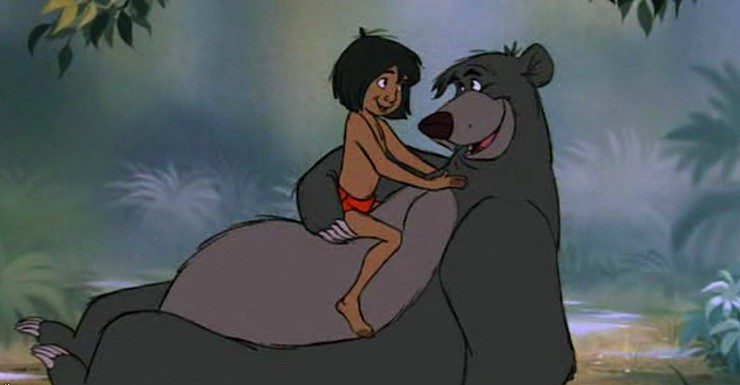
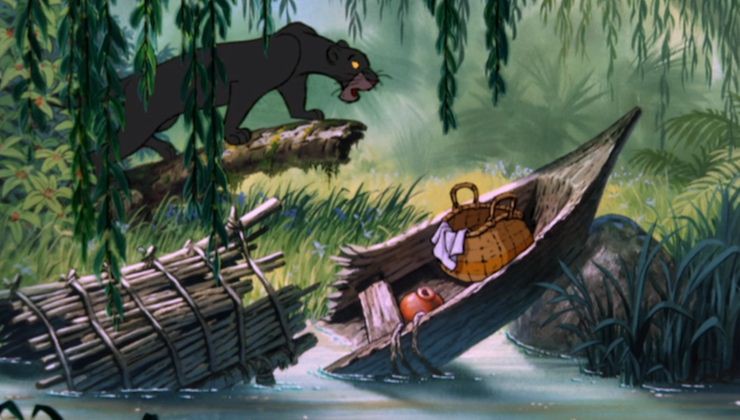
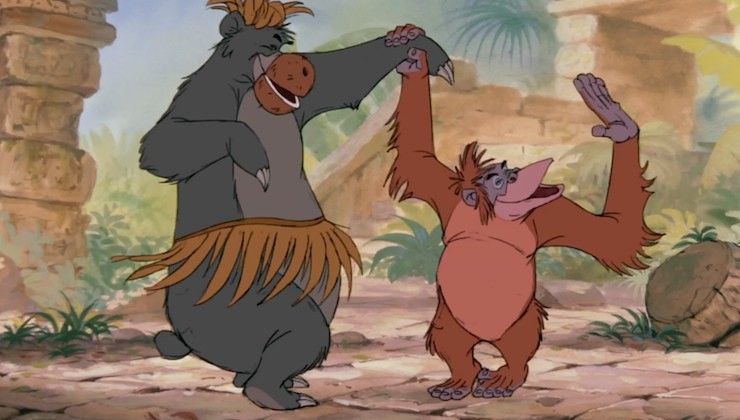
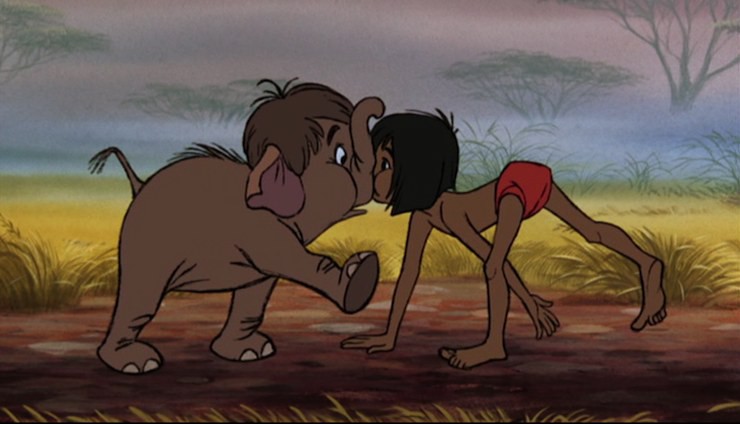
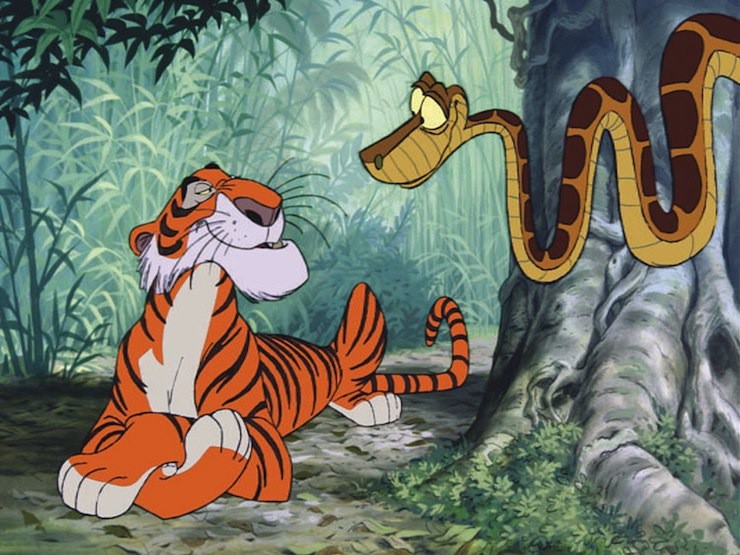
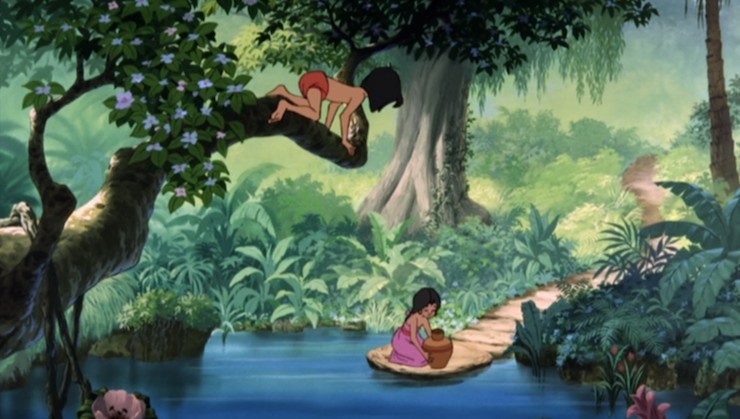
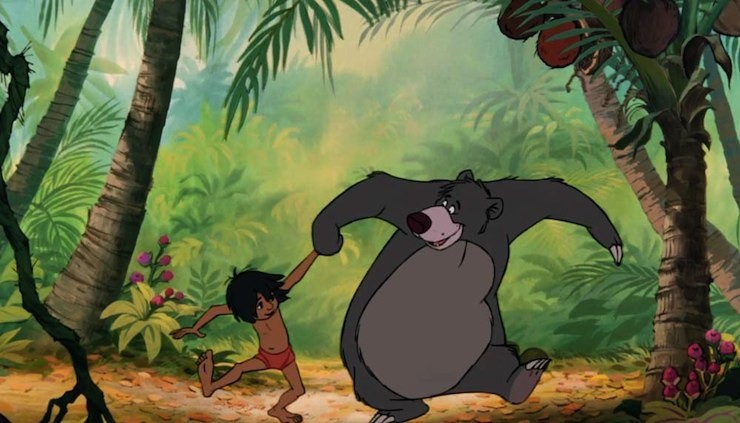



I don’t think Mowgli will have too hard a time adapting to the village. As you said, he makes friends easily. And who’s to say he can’t visit his friends in the jungle from time to time? And if the kid can get several animals on his side against a tiger, he’s a benefit to the village as well. Maybe this was touched on in the sequel. I don’t know. I never saw it. Didn’t want anything to ruin my image of this wonderful film.
Anyway, this is an excellent review, Mari. Keep up the great work!
It made sense to me that he would resist leaving for a new place but would become curious once he actually saw other human beings.
I am fully willing to admit that I am powerfully influenced by nostalgia and repeated viewings at an early and impressionable age, but I love The Sword in the Stone and Disney’s Robin Hood. I’ll even support the fact that story-wise The Sword in the Stone is a complete mess, but this is some of the first negative commentary I’ve run into about Robin Hood. I always kind of thought that it was generally well-liked.
I suppose it is easy to lose sight of the quality of our cinematic comfort food. My college roommates and I would put both of them on regularly to play in the background while we worked on papers and such.
I am really enjoying this read-watch though and this was another great one. Thanks!
I haven’t seen this movie since I was a kid, but I remember thinking that the girl was the first human Mowgli had ever seen and he suddenly realized there were other people who looked like him (walked like him, talked like him…sorry, that song’s in my head now), and he belonged with them in a way that he would never truly belong with the animals. Of course, I was probably 10, so I might have failed to grasp the subtleties of making a family vs being born into a family etc. Plus, I was 10, so happy romantic ending!
I also loved Robin Hood as a kid, though I saw it within the last few years, and yeah, it’s not very good. I realized I still have all the songs memorized, though! I think we had the soundtrack — probably on vinyl to be played on my Fisher-Price record player. I would kind of like to watch Jungle Book and Robin Hood back to back now, just to see the reused scenes.
This is a great review series, Mari! I look forward to it every Thursday!
“’Tis he, O girl! O, discover thy beauty, thy comeliness shew (him),
So that thy loveliness he may possess—(O), in no wise be bashful,
Ravish the soul of him, as soon as his eye on thee falleth,
He, forsooth, will approach thee, and thou—O, loosen thy mantle,
So that he clasp thee, and (then) with the wiles of a woman shalt ply him;
(Wherefore) his animals, bred in his desert, will (straightway) deny him,
(Since) to his breast he hath held thee.”
Seduction of Enkidu, a 4000+ year old trope. Of Course he’s going to get a (literally) funny look on his face and follow her into the village.
I agree that it’s not what a “real” wild boy would do, but if many historical boys claimed to be wild may have actually be autistic boys, a non-hostile approach from a female might indeed work.
— — — — —
I’m surprised to learn that Disney approached the Beatles. I took the narrative of the movie to be hostile to the trend of long hair on men. From the elephant getting a crew cut to the disreputability of the vultures, and the monkeys, no love lost on long hair or modern music in the text in my reading. Baloo is presented as being irresponsible for enjoying such things, and they overcome the monkeys because they’re lucky (plot armor) and because the monkeys were presented as incompetent beatniks.
— — — — —
In my opinion, the incompetence and irresponsibility of Baloo and the Vultures is set up to be overcome when they save Mowgli from Shere Khan. They are sticking their necks out to do the right thing and thus redeeming their previous behavior. So they triumph because of righteousness, not because the Tiger is weak. The movie is just very unrealistic, and is best savored, rather than dissected.
Have to issue the internet guy correction, just because the show was truly that good at times. TaleSPIN!
I saw the stage version performed in Boston. They added additional Indian influenced numbers and the wolves had a larger role and there was more of the Kipling story included as well. If you get the chance go and see it.
I have to disagree about Sanders. His understated silky voice was very good at conveying quiet menace.
Hah, we were on vacation this past week at my in laws’ and somebody put this movie on for the kids, so I’ve recently re-watched it! And I was thinking about how it was great timing for the read watch :D
This is another one of those ‘watched it as an adult’ movies but I do like it. Not on my top 10, but it’s got some cute, silly, funny moments, and the songs are fun.
We have to take a second to talk about the Sherman Brothers, whom I adore. It’s funny you mention the song by the girl as being less memorable, because that is absolutely the song I always think about when I think about this movie, and probably one of my favorites. I’m not talking about the lyrics – in fact, they’re probably kind of sexist if you squint at them hard enough (or then again, maybe not. I’m not knocking anybody who looks forward to running their own home). But OMG, the melody. I love the melodies of the Sherman Brothers and something about it is incredibly haunting and addicting to me. A few years back I watched a really interesting documentary on them and it was interesting how their two personalities contributed. (I’m pretty sure there is a DTV sequel where the girl gets more characterization and I think they DON’T end up together in the end)
This maybe came up in another one of the movies, but I don’t get the impression we are supposed to root for Mowgli to stay with Baloo. It’s kind of like ‘Hakuna Matata’ – yeah, it’s nice for awhile, but that’s not what growing up is about. I suppose there is something to say about family, and if we choose it, or if we can fight ‘who we are’, and if Mowgli is better off or not. But as others and you have noted – he’s adaptable, likeable and clever.
A few other points:
1)I really enjoyed Sanders’ performance
2)Regarding the comments, the vultures came off as positive to me because, as you said, they are loyal and stick up for their friend (and were quick to welcome him into their group to start with). I never got the impression they were considered otherwise lazy or incompetent.
And, since we don’t get to talk about them later – I really like both the Aristocats and Robin Hood. Robin Hood I remember as a child and I always loved it (although I’ve watched it as an adult and can agree there are some dull parts). But I loved your story too :)
Have to second everyone who enjoyed George Sanders as Shere Khan, I think he really sells it. It makes me curious what direction the new film will go in, since Idris Elba has a very different sort of voice. Personally I would have cast Giancarlo Esposito as Shere Khan and Idris Elba as Akela, but of course Elba is the bigger name.
Jungle Book is my favorite Disney movie. I love the sound track (and everything else about it). Truth be told I have the Jungle Book soundtrack on my ipod. So my opinion is far from objective. The re-release of the film in theaters in the late 70’s was the first movie I ever saw in the movie theaters.
I think Bare Necessities hold its own against any of the other recent great Disney movie songs. If Bare Necessities appeared for the first time in a movie today, it would drive parents as crazy as did “Let it Go”. Children everywhere would be singing Bare Necessities.
Thanks for reading my memories (and allowing me to relive my childhood).
AndrewHB
Beat me too it. I loved that show.
1) I disagree about George Sanders’s voice, but that’s neither here nor there, as I am biased by an important fact: I don’t remember a time when I wasn’t aware of this movie. We had the soundtrack on 8-track, so I distinctly recall one of the tracks changing halfway through Bare Necessities. (I think I was 3. Maybe 4.) At 3, that voice is terrifying.
2) I never connected the narrator of Winnie The Pooh with Bagheera, but I knew it was familiar. I have finally connected the dots!
3) It always struck me as odd that Mowgli would go ga-ga over a human female and think she was pretty: he was raised with a different standard of beauty that she wouldn’t have fit at all.
4) I still love the song of the vultures, as not-Beatles-esque as it is. And the “What you want to do, Flaps?” “I dunno, what you want to do?” bit still makes me grin.
Saw it when I was 12. Had read the books. Visually nice but disappointing in plot. Boys–run around almost naked with shaggy hair and have adventures and fun in the woods; girls–wear an impractical-looking dress and lay-down hair and work all the time. Blech! And I’ve never been into the romance stuff at all, so the ending sucked. Fun up till then, though.
My two cents on the ending, which I also agree works better for me than it does for Mari Ness. Like @8, I love the melody of “My Own Home”, and the way it works with the musical contrast that runs through the whole film. . .like the lyrics have suddenly gone to the same place that the beautiful and non-jazz-influenced score by George Bruns always was. . .it feels like the Bruns score is expressing something subconscious that contrasts with the jazz world of the animals.
And, yes, the lyrics are sexist and normally that would drive me crazy. . .but I think what’s more interesting is that they’re about civilization. Mowgli has never known community except among the wolves, and he’s certainly never experienced the rituals that set human apart from animal life (especially in a version where the Jungle Law is never mentioned. . .). I think there’s something very effective about him being drawn in by civilization, not just flirting by a pretty girl. So I can forgive the sexism, given that, no matter how crazy the animators want to go in the animal world, if you’re suddenly depicting Indian village/tribal life and the pattern of civilization ISN’T gender-traditional, it’s just jolting, out of period, and too weird. Over the suspension of disbelief threshold.
When I was a kid, one Christmas I got a very early personalized book—a tie-in children’s book to The Jungle Book, featuring a character whose face was never shown who was ostensibly intended to be me, because he had my name. The book was colored art pages but with text printed on a mainframe line printer (so that the character based on me could have my name inserted in the text).
It’s funny, because I had never actually seen the movie it was based on, or at least couldn’t remember having seen it. Wish I still had the book; it would be an interesting artifact.
I will grant that the Disney animated Robin Hood feature is decidedly thin, but I will also grant that it has a certain nostalgic charm. What may be telling is this: if you remove the Disney animated feature from consideration, what modern feature-length version of Robin Hood — animated or live-action — do you show a 10-year-old who’s been getting his or her Robin & company from Howard Pyle and Roger Lancelyn Green?
I don’t think there’s a good answer to that question. From Connery and Costner straight through to Crowe, every cinematic version strikes me as either too violent or too revisionist (or both) to be counted a viable youngster-friendly introduction to the Robin Hood tradition. That leaves one with the three classic-era treatments — Douglas Fairbanks, Errol Flynn, and Richard Todd, the most recent from 1952 (!) — and I am just not sure that any of those (no, not even the Flynn) is going to hold up nowadays for a younger audience.
Which is to say, I think there’s an opportunity here for someone to make a good straight-ahead Robin Hood feature — not a reboot, not a re-interpretation, not a modern riff, but a solid straight-ahead treatment of the classic tales — and clean up big-time at the box office.
ETA: You know, I remember a movie studio that used to be good at that kind of thing….
I watched “The Bare Necessities” and “I Wanna Be Like You” approximately 3 gazillion times on a Disney Sing-Along video, but I’ve only seen snippets of the actual film (plus some Jungle Cubs episodes). As a lifelong sucker for gluttons, I thoroughly enjoyed film-Baloo, but I don’t like what I’ve heard about the other changes they made, especially turning Kaa into a laughable secondary badguy. Don’t mess with Kaa’s character, people. His monkey-defeating debut in the book was beautiful, and his subsequent friendship with Mowgli was adorable. Also, India has no (wild) orangutans, and an elephant calf is probably bigger than that.
Still, I’d like to see the whole film sometime.
Never watched much of Robin Hood, though I hear the fox inspired many youthful crushes. Trying to read the book, but got terminally bored by its repetitive fights, feasts, and bouts of boasting. It reminded me of The Odyssey, only with shorter sentences and less actual killing.
Winnie-the-Pooh, however…*starts humming the first film’s theme song*
#17
I second that. Would be great to see a modern Robin Hood that’s not so… modern. Hopefully the powers that be in Hollywood will finally get out of this dark and gritty funk and give us a decent swashbuckler. I couldn’t get through the mopey Ridley Scott version. Maybe Disney can do it again.
I love this one so much. The music is just wonderful, and was my introduction to jazz when I was but a wee thing. It’s still a thing with my family that when we’re pondering what we should do for the day when I visit my parents, as soon as someone says, “What do you want to do?” we launch into the entire vulture riff and might even get as far as singing “That’s What Friends Are For.”
I liked the song at the end, too, perhaps because it was the only song sung by a girl in the movie, so it was one I could sing in character, but also because it’s really pretty.
I happen to like the Disney Robin Hood, but a lot of that has to do with the music. I did notice the last time I watched it how much is recycled from other films. The “football” scene is right out of the animated segment in Bedknobs and Broomsticks, along with a lot of other parts taken from The Jungle Book.
#17 – What a great idea! I’d love to see a Robin Hood who was like the Howard Pyle character, or, heck, even the T.H. White take (in the book The Sword in the Stone). I like Kevin Costner and I love Russell Crowe, but I had to hold my nose watching both versions and both were major disappointments. Well, maybe the pendulum will swing back from the gore-and-grit approach in another 10 years or so. In the meantime, there’s always Robin and Marian.
Gotta be the naysayer here. As a kid who read the books early and loved them, when I saw the movie as a kid I was totally non-plussed. Mess with Bagheera?!? Blasphemy! Sher Khan was the only one that approximated the characters as they lived in my head. Bleah. Kipling was a %#$&ing brilliant storyteller, and I they bungled the Story.
I’ve only ever seen this one once, so I don’t have much to say about it.
Pooh, however. OH MY do I have FEELS about Pooh! I know you’re going chronologically, but how I wish we could talk about some of the sequels. We are partial to Piglet’s Big Movie here, hell Spawn, now a towering 14 teen year old too cool for kids stuff, watched it on Netflix the other day. I heard the music and was like “Are you watching that?” And she blushed and went “Yeah, what of it?”
@17 — I have found that the Richard Todd “The Story of Robin Hood [and His Merrie Men]”–the Disney live-action version–does indeed work for some contemporary kids who got their Robin Hood from Howard Pyle and Roger Lancelyn Green. Maybe it works for girls more than for boys? More character development than the Fairbanks/Flynn swashbucklers, more of an ensemble piece. Leonard Maltin says, “Zesty, colorful retelling of the familiar story, filmed in England by Walt Disney with excellent cast. Not as personality-oriented as other versions, but just as good in its own way.” It’s a pity that more kids don’t get to see this version. Disney didn’t help the cause by waiting a long time to issue it on DVD, and having the DVD initially only available if you joined their movie club.
Leonard Maltin on the Disney animated “Robin Hood”: “Undistinguished Disney cartoon feature is pleasant enough for kids, but lacks story strength (and heart)…. Disney’s live-action STORY OF ROBIN HOOD was much better.”
“The Jungle Book” made no particular impression on me, aside from the musical highlights.
I know I watched this one as a kid, but I forgot pretty much everything about it. It’s just not that memorable to me. Also, as an ex cub scout leader, I’m contractually obligated to say that I love the books more. ;)
And I wouldn’t say that Robin Hood is not based on text: it’s a clever (though largely uninentional and caused by asset recycling) mash-up of Robin Hood and Reynart the Fox. Also one of my favourite Disney movies, despite all its technical shortcomings,
I have to agree with @@@@@22, Jungle Book was one of my favourite books and by the time I saw the movie I knew it almost by heart. So it was a huge disappointment, all my favourite characters were caricatures, all the favourite moments gone… I couldn’t enjoy the story at all because of this.
I saw Jungle Book in theater during the late 70’s re-release(which is roughly when I saw Song of the South, did Disney re-release everything?) and the only things I remember are “Bare Necessities”, and Shere Khan’s voice. The perfect Villain Voice.
@18 Agree 100% about the movie’s re-characterization of Kaa as a villain. I saw this movie when it first came out–I was 9, and had just finished reading the stories–and that was what appalled me the most. I’d thought that Kaa was the coolest characters in the stories of all the “grown-up” characters: Baloo was like a schoolteacher, Bagheera was like a camp counselor, but Kaa was that cool older kid who was still willing to be your friend and listen to what you said. The team of Mowgli and Kaa in “The King’s Ankus” and “Red Dog” makes those stories among my favorites.
As for George Sanders as the voice of Shere Khan, he kind of creeped me out–sounded more like that “funny” adult family friend who’d ask you to sit in his lap when you were little, but even then you knew it would be a bad idea.
I remember seeing this at the drive-in when I was a kid, and I later had a cassette with songs from various Disney movies. “The Bare Necessities” and “I Wanna Be Like You” were my two favorites on there, and I played them a lot. I do think it’s interesting that two 70s Disney films in a row (this and “The Aristocats”) had soundtracks with a lot of jazz. Was jazz enjoying a resurgence at this point, or was Disney a bit behind the times?
I have to agree with the people who loved Shere Khan’s voice. Was this one of the earliest examples of the villain being a smooth British accent? Bagheera was British as well, though, so maybe it’s just big cats that talk like they’re from England. As for King Louie, although there aren’t orangutans living in the wild in India, I’ve seen it suggested that Disney used one because they have opposable thumbs and presumably COULD make fire if they knew how. Or maybe they just liked the idea of his playing jump-rope with his own arms.
Huh, I really like the Disney Robin Hood film. (And though I think your story is fine, I’m a little nonplussed that you offer it as all you can say about the Robin Hood mythos, and then handwave everything else away. Frankly, it comes off as dismissive at best, and rather arrogant at worst.)
@@@@@ LisaMarie – there was a sequel in 2003, and it was one of the few that was actually released in theaters. It shows Mowgli trying to fit in with his new family in the village, but struggling because he misses the freedom of the jungle, which the villagers fear. He and some of the other children end up in the jungle fighting Shere Khan, who I believe ends up falling into a volcano… It wasn’t too bad, really. They obviously couldn’t have Phil Harris so they substituted John Goodman, who gave a valiant effort at being Baloo. (I haven’t seen it since I watched it in the theater.)
I watched the movie before I ever read the book, and I like both. I actually find it kind of amusing that when Disney said to ignore the source material as much as possible, they managed to get so much completely opposite! Bagheera strict and Baloo the old softy; Hathi a comic figure rather than imposing; Kaa another enemy rather than an ally – and Mowgli susceptible to his hypnotism rather than the only one who can resist it!
Good point, @25. Though I wonder if “unintentional” is strictly correct–at that point there were reams of development and story art for Chanticleer, which never went into production. Could easily have influenced the idea of mashing up Robin Hood with the beast fable genre.
George Sanders as Sher Khan is good if you are watching the Disney films in order. Once you get to Jeremy Irons’ Scar, you realize that Sanders was merely adequate.
@33 Two totally different takes: Scar was more ferocious, and speaks more to today’s grittiness.. Shere Khan brought up images of the lost British Empire and a more civilized villainy..
I’m kind of disappointed that we’re not getting your take on the Aristocats, only because I would have loved your reaction to the Siamese cat, because… yeeeeeeeeaaaahhhh.
I really dislike the Disney Robin Hood, and am glad that wasn’t what introduced me to the legend. As to who did, why it was Bugs Bunny and Daffy Duck of course! And since Errol Flynn had a cameo in that cartoon as Robin, I had to go and watch that movie. There’s a reason the film is a classic and still holds up today, and it’s the memorable characters, lovely sets, beautiful filming, great sense of fun and adventure, and above all, that incredible score. My whole family loves this, from the oldest down to the kids.
This Robin has engendered a love of the legend that has made my family watch every version we can get our hands on. There are some terrible live versions, but the Disney one, which we’ve tried to watch twice, is considered the most boring. It’s sad when cartoon characters seem to be just there for the money, with flat delivery of colorless lines. Only Prince John is a 3D 2D character, I think because Ustinov remembered from the Flynn version that this was supposed to be fun.
I remember thoroughly enjoying The Jungle Book as a kid, and to me, the ending hit the spot. For all the fun Mowgli had with his animal friends, his true home was with his own kind.
As far as the Disney Robin Hood cartoon goes, I was much less impressed. Even to my young eyes and ears, the mishmash of accents was jarring, the plot felt disjointed, and the animation was stiff at best. For the best portrayal of Robin Hood in a cartoon, you need to look no further than Warner Bros’ “Robin Hood Daffy,” with its iconic “yoiks and away” scene.
Zomg, how can you skip Aristocats? That’s my favorite Disney movie ever, and had some of the best songs of all time.
Very disappointed!
Nobody’s mentioned the bathing suit? I always found that terribly distracting — especially during Bare Necessities.
I read a post elsewhere where someone said the girl in Jungle Book was the first Disney Heroine whose song they related to. She wasn’t singing about the guy she wanted or didn’t want, she was singing about doing chores! And looking forward to the day she could get someone else to do the chores! Enter Mowgli!
As a kid, I think I had the idea that Mowgli was an orphan recently lost in the jungle. I’d listened to the music tons of times before seeing the movie, which might have helped. Taken that way, it makes sense. Mowgli is a sort of Alice in Wonderland and Bagheera is the Rabbit trying to get him back to his world. Yes, the jungle looks great, but Wonderland isn’t where human kids were meant to live.
It was quite a shock when I read the book and discovered the wolves were an important part of the story. Although, for craziest adaptation, I’d suggest Full Pack (Hokas Wild) by Poul Anderson and Gordon R. Dickson. A bunch of Teddy Bear aliens decide they’r the wolves and Baloo and that the little kid who had the book is Mowgli. Then, they meet the aliens they decide are Shere Khan, the Bandar-Log, and Kaa.
King Louis is the one I don’t get in the movie. He wants to give up being King of the Monkeys for village life? Yeah, how long is that going to last?
I always liked this movie as a kid, although I haven’t seen it for many, many years. Then again, I never read the original source material, so I came to the movie unfettered by expectations. It appears from your two reviews that this helps. ;) But for many years Shere Kahn (and his smooth, sinister voice) was sort of the gold standard for me in terms of cartoon villains. It grieves me that you didn’t find him similarly affecting.
Also sad that you won’t be reviewing The Aristocats, which I adore, but it seems something of a relief that you won’t be reviewing Robin Hood. I utterly adored this movie as a child – the story was fun, the characters were fun, the songs were fun, and I managed to eventually kill the VHS copy at the local video store from rewatching. I saw it again a few years ago in a fit of nostalgia and still really enjoyed it too. About the only thing I can say against it is that the song from the opening credits got sped up and turned into the Hamster Dance. -_-